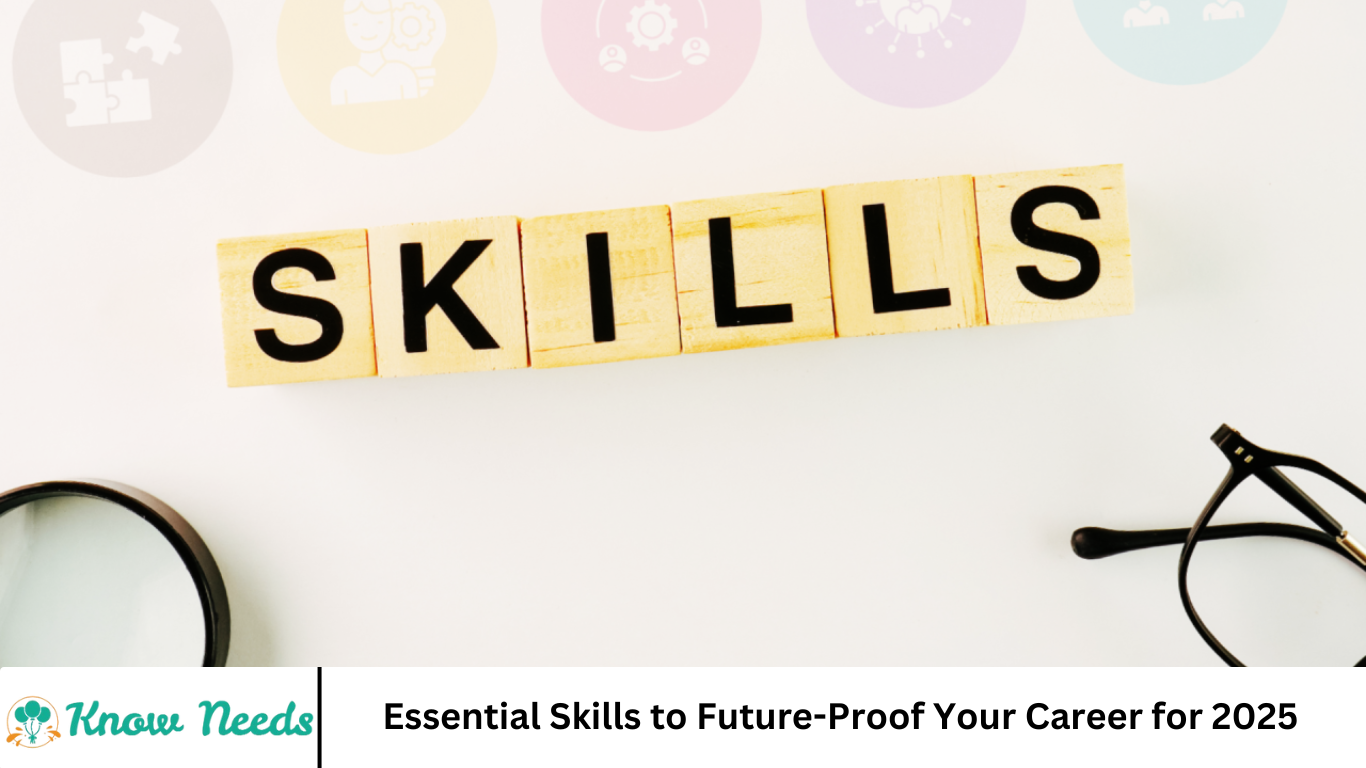Rapidly evolving job market, the phrase “future-proof your career” has never been more relevant. As we approach 2025, the landscape of work continues to shift dramatically due to technological advancements, automation, and artificial intelligence (AI).
The skills that secured jobs just a few years ago may no longer be sufficient to keep you competitive. To thrive, you need to develop essential skills that not only match current demands but anticipate future trends.
This comprehensive guide will explore the top skills you must cultivate to future-proof your career by 2025 — ensuring you stay employable, adaptable, and ready for emerging opportunities.
More Read: Looking to Change Careers in 2025? Here’s Your Guide to Switching Industries
Why Future-Proofing Your Career Matters
The global workforce is undergoing unprecedented transformation. Automation is replacing repetitive manual tasks, AI is revolutionizing decision-making, and new digital tools are reshaping industries from healthcare to finance, marketing to manufacturing. These changes mean that many traditional roles are evolving or disappearing altogether.
Future-proofing your career means investing in skills that are resistant to obsolescence — those that complement technology and emphasize human strengths such as creativity, emotional intelligence, and complex problem-solving. It also means cultivating agility, so you can adapt to new roles and industries as opportunities arise.
Failing to evolve your skillset risks career stagnation or redundancy. On the flip side, proactively acquiring the right skills opens doors to leadership, innovation, and more fulfilling, higher-paying roles.
Top 10 Essential Skills to Future-Proof Your Career for 2025
1. Digital Literacy and Tech Savviness
Digital skills are no longer optional—they’re foundational. Employers across all sectors expect workers to be comfortable using digital tools, software, and platforms. This includes:
- Proficiency with collaboration tools (e.g., Slack, Microsoft Teams)
- Basic understanding of data analysis and visualization tools
- Familiarity with cloud computing and cybersecurity principles
- Ability to adapt quickly to new software or digital environments
Understanding emerging technologies like AI, machine learning, blockchain, and the Internet of Things (IoT) will further enhance your marketability
2. Data Analysis and Interpretation
Data drives decision-making in today’s organizations. Being able to analyze, interpret, and draw insights from data is critical. This skill set involves:
- Competence with data analytics tools (Excel, Tableau, Power BI)
- Ability to interpret metrics to improve business processes
- Understanding data privacy and ethical considerations
Roles requiring data literacy range from marketing specialists to supply chain managers, making this skill highly versatile.
3. Emotional Intelligence (EQ)
As automation handles technical tasks, uniquely human skills like emotional intelligence gain prominence. EQ involves:
- Self-awareness and self-regulation
- Empathy and social skills
- Effective communication and conflict resolution
Leaders and team players alike need EQ to navigate complex interpersonal dynamics and foster positive work environments.
4. Critical Thinking and Problem-Solving
Complex problems require creative solutions. Critical thinking entails questioning assumptions, evaluating evidence, and making informed decisions. This skill is valuable in:
- Strategic planning
- Innovation and product development
- Crisis management
Employers value professionals who can tackle challenges proactively and with innovative approaches.
5. Adaptability and Resilience
The only constant in the modern workplace is change. The ability to quickly adapt to new circumstances and bounce back from setbacks is essential. This includes:
- Embracing lifelong learning
- Being open to career pivots
- Managing stress and uncertainty effectively
Resilience helps you maintain productivity and motivation even during periods of disruption.
6. Creativity and Innovation
Automation can handle routine tasks, but creativity remains a human stronghold. Creativity is vital for:
- Developing new products or services
- Improving processes
- Crafting compelling marketing campaigns
Innovative thinking fuels growth and helps companies differentiate themselves in competitive markets.
7. Communication Skills
Clear and persuasive communication is crucial for collaboration, leadership, and customer relations. This includes:
- Written communication for reports, emails, and proposals
- Verbal communication in meetings and presentations
- Active listening to understand others’ perspectives
Strong communicators build trust and influence within their organizations
8. Leadership and People Management
By 2025, leadership skills will extend beyond traditional hierarchical roles. Effective leaders:
- Inspire and motivate diverse teams
- Manage remote and hybrid workforces
- Drive organizational change and culture
Developing leadership capabilities increases your value and opens pathways to senior roles.
9. Cross-Cultural Competency and Global Mindset
Workplaces are becoming increasingly global and diverse. Being able to collaborate across cultures requires:
- Cultural sensitivity and awareness
- Effective communication with diverse teams
- Adaptation to international business norms
This skill is crucial for companies expanding globally or serving international clients.
10. Project Management
With the rise of agile methodologies and cross-functional teams, project management is a highly sought skill. It includes:
- Planning, executing, and monitoring projects
- Managing budgets and resources
- Risk assessment and mitigation
Certification in project management frameworks like PMP or Agile can significantly boost your employability.
How to Develop These Skills Before 2025
Take Online Courses and Certifications
Platforms like Coursera, Udemy, LinkedIn Learning, and edX offer targeted courses in tech, data analysis, leadership, and more. Certifications add credibility to your resume.
Engage in Lifelong Learning
Commit to continuous education by reading industry publications, attending webinars, and participating in workshops.
Gain Hands-On Experience
Volunteer for cross-departmental projects, freelance, or take on stretch assignments at work to apply new skills.
Network and Learn from Peers
Join professional groups, attend conferences, and seek mentors to stay informed about emerging trends and best practices.
Embrace a Growth Mindset
View challenges as opportunities to learn rather than threats. Be curious and open to feedback.
The Role of Artificial Intelligence in Shaping Future Careers
Artificial intelligence is not just a disruptor; it’s also a powerful enabler. Many jobs will integrate AI tools to enhance productivity, automate repetitive tasks, and provide data-driven insights. Understanding AI basics and how it applies to your field can set you apart.
For example:
- Marketers use AI for customer segmentation and campaign optimization.
- HR professionals leverage AI-driven recruitment tools.
- Healthcare providers employ AI for diagnostics and patient management.
Rather than fearing automation, embrace it as a tool that can augment your capabilities.
Frequently Asked Question
What does it mean to future-proof my career?
Future-proofing your career means developing skills and adaptability that ensure your employability and relevance despite rapid changes in technology, industry demands, and job market shifts.
Which skills are most important to focus on for 2025?
Key skills include digital literacy, data analysis, emotional intelligence, critical thinking, adaptability, creativity, communication, leadership, cross-cultural competency, and project management.
How can I start developing these future-proof skills?
You can begin by taking online courses, gaining hands-on experience, networking, seeking mentorship, and committing to continuous learning and self-improvement.
Is technical knowledge more important than soft skills for future jobs?
Both are crucial. While technical skills get your foot in the door, soft skills like emotional intelligence, communication, and adaptability distinguish you and help you thrive long-term.
How does AI impact the skills I need for the future?
AI automates routine tasks but enhances roles that require creativity, decision-making, and human interaction. Understanding AI and its applications in your field can boost your competitiveness.
Will learning new skills guarantee job security?
While no skill guarantees absolute security, staying proactive about learning significantly improves your chances of staying relevant and seizing new opportunities.
What if my current job becomes automated or obsolete?
If your role is at risk, use future-proofing strategies to pivot into related fields or roles that emphasize uniquely human skills, such as leadership, problem-solving, and creativity.
Conclusion
Future-proofing your career requires intentional effort and strategic planning. By cultivating a mix of technical expertise, human-centric skills, and a mindset open to change, you position yourself to succeed in 2025 and beyond. Remember, the jobs of tomorrow will demand not only what you know but how you adapt, collaborate, and innovate. Invest in these essential skills now to ensure your career remains resilient, relevant, and rewarding.


